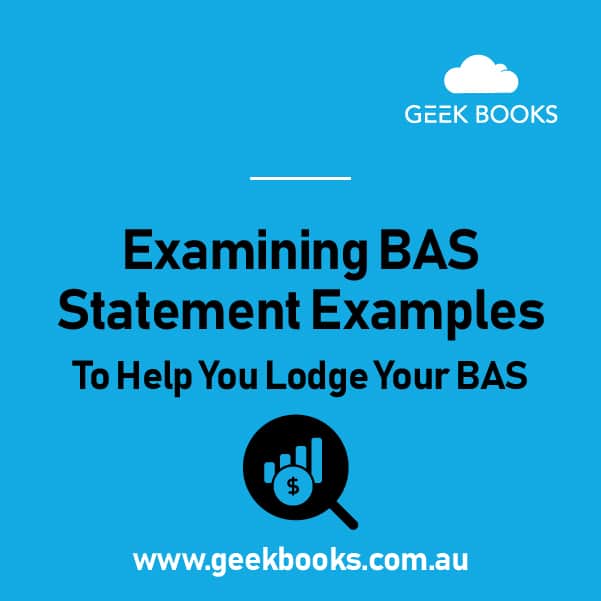All Australian business owners, take note: A Business Activity Statement (BAS) isn’t just paperwork; it guarantees crucial compliance with Australian tax laws!
Lodging a BAS ensures your business is paying the correct amount of tax to prevent legal issues, build a reputation for reliability, and secure financial benefits through appropriate deductions and credits.
How can you be sure to lodge your BAS correctly?
Let’s be honest; it isn’t a walk in the park! But this guide is here to simplify the process.
By providing BAS statement examples, we’ll help you understand what’s required to complete your BAS submissions correctly for compliance and peace of mind.
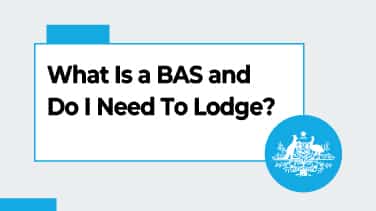
What Is a BAS and Do I Need To Lodge?
A BAS is a form you submit to the Australian Taxation Office (ATO) to report and pay the various taxes associated with your business operations:
- Goods and Services Tax (GST)
- Fringe Benefits Tax (FBT) instalments
- Pay as You Go (PAYG) income tax instalments
- PAYG tax withheld
And several other possibilities, depending on your business:
- Wine Equalisation Tax (WET)
- Luxury Car Tax (LCT)
- Fuel tax credits
Do all business owners in Australia need to lodge a BAS?
You’ll need to lodge if your business has an annual turnover of over $75,000.
However, if you’re an Uber driver or other ride-share operator, you must submit a BAS regardless of your income level.
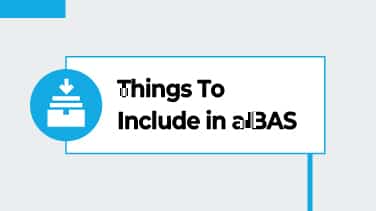
Things To Include in a BAS
Here’s a breakdown of the key elements you need to include in a BAS:
- Sales for the period. How much money your business made in sales during the reporting period- not just cash transactions but all sales, whether you received payment or not.
- GST collected. The Goods and Services Tax (GST) you’ve charged your customers, which you must pass on to the government.
- GST paid on expenses. The amount of GST you’ve paid on business-related expenses.
- Wages paid to staff. The total wages paid to employees during the reporting period.
- PAYG withholding. Pay As You Go (PAYG) withholding is the tax you withhold from your employees’ wages before paying them.
How Often Do I Lodge?
The frequency at which you lodge your BAS depends on your business’s GST turnover.
If your annual GST turnover is over $75,000 and under $20 million, you’ll lodge your BAS quarterly.
If your business has a GST turnover of $20 million or more, you must lodge your BAS monthly.
Some businesses below this threshold also choose to lodge monthly for their convenience.
If your turnover is less than $75,000 ($150,000 for non-profit organisations) and you’re voluntarily registered for GST to claim GST credits on purchases, you can lodge your BAS annually.
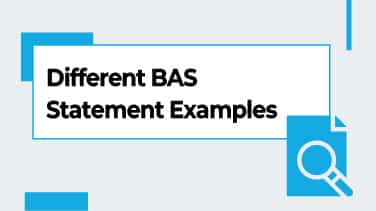
Different BAS Statement Examples
Here are the different BAS forms for Australian businesses from the ATO.
| Form Name | Reporting Period and Type | Who the Form Is For |
| BAS A | Quarterly BAS | Those with quarterly GST, PAYG tax withheld, and PAYG income tax instalment obligations; typically sole traders and companies. |
| BAS C | Quarterly BAS | Those with quarterly GST, PAYG tax withheld, PAYG income tax instalments, and possibly fringe benefits tax instalments, wine equalisation tax, or luxury car tax. |
| BAS D | Quarterly BAS | Those with a quarterly GST only; typically partnerships and charities. |
| BAS F | Quarterly BAS | Those with quarterly GST and PAYG tax withheld obligations; typically partnerships and charities. |
| BAS G | Monthly BAS | Those with monthly GST and any other obligations. |
| BAS P | Annual GST Return | Those who pay their GST in instalments and lodge an annual GST return or are eligible to report and pay their GST annually. |
| BAS Q | Annual GST Report | Those who have paid and reported GST quarterly using GST Option 2. |
| BAS R | Quarterly PAYG Instalment Notice | Those who have elected to pay an instalment amount (Option 1) and only have a reporting obligation if varying. |
| BAS S | Quarterly GST Instalment Notice | Those who have chosen to pay GST instalments quarterly (Option 3) and only have a reporting obligation if varying. |
| BAS T | Quarterly GST and PAYG Instalment Notice | Those paying GST and PAYG instalments quarterly with a reporting obligation if varying one or both of these amounts. |
| BAS U | Quarterly BAS | Those claiming a fuel tax credit with quarterly GST, PAYG tax withheld, and PAYG income tax instalment obligations. |
| BAS V | Quarterly BAS | Those claiming a fuel tax credit with quarterly GST, PAYG tax withheld, PAYG income tax instalment obligation, and possibly fringe benefit tax instalment, wine equalisation tax, or luxury car tax. |
| BAS W | Quarterly BAS | Those claiming a fuel tax credit with a quarterly GST obligation only. |
| BAS X | Quarterly BAS | Those claiming a fuel tax credit with quarterly GST and PAYG tax withheld obligations. |
| BAS Y | Monthly BAS | Those claiming a fuel tax credit with monthly GST and any other obligations. |
| BAS Z | Annual GST Return | Those claiming fuel tax credits with an annual GST obligation and those with wine equalisation tax or luxury car tax obligations. |
| RBAS (Revised Business Activity Statement) | Those who need to revise an activity statement or apply for an amendment. |
BAS Statement Example for an Electrician
Let’s consider a hypothetical scenario of an electrician named John who owns an electrical business called ElectroSpark.
What would ElectroSpark’s BAS quarter look like?
| BAS Component | Total |
| Income Breakdown | $45,000 (Electrical repairs, installations, maintenance services) |
| GST Collected | 10% on $45,000 = $4,500 |
| GST on Business Expenses* | Equipment purchases: $5,000 11 = $454.55 GST
Vehicle maintenance: $1,000 11 = $90.91 GST Total GST Credits: $545.46 |
| Net GST Owed | $4,500 (collected) – $545.46 (credits) = $3,954.54 |
| PAYG Withholding for Employees | Employee 1: annual salary of $50,000, PAYG withholding of $9,500 per year
Employee 2: annual salary of $40,000, PAYG withholding of $6,000 per year Quarterly withholding: ($9,500 + $6,000) 4 = $3,875 |
| PAYG Instalments for John’s Income | Expected taxable income: $100,000 for the year.
Estimated tax on this (excluding Medicare levy and other adjustments): $24,500 Quarterly PAYG instalment: $24,500 4 = $6,125 |
*To calculate the GST on business expenses, divide the total GST-inclusive expense amount by 11 to extract the GST component from it.
This accounts for the fact that the price you see already includes GST.
So, in this scenario, John would report the following on his quarterly BAS:
- Total income: $45,000
- Net GST owed: $3,954.54
- Total PAYG withholding: $3,875
- PAYG instalment: $6,125
Keep in mind that these figures are approximations for illustrative purposes.
Actual calculations depend on precise income and tax rates.
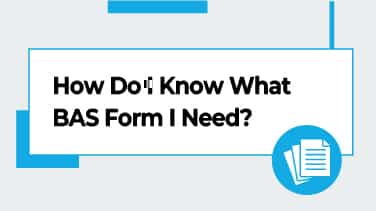
How Do I Know What BAS Form I Need?
Here’s how to determine the right BAS form for you.
- Tax types and obligations: Identify the taxes relevant to your business. If you sell goods or services, you must pay GST tax, and if you have employees, account for PAYG instalments and withholding. Additionally, factor in any specific taxes related to your business: fringe benefits tax (if you provide certain non-cash benefits to employees), wine equalisation tax (if you deal with wine), or luxury car tax (if you sell or import luxury cars).
- Reporting frequency: Determine your reporting frequency depending on your GST turnover. Businesses with a GST turnover of $20 million or more usually report monthly, while those below $20 million and above $75,000 typically report quarterly.
- Specific business characteristics: The structure of your business (sole trader, company, partnership, or charity) can influence the type of BAS form you need, as different entities have different reporting requirements.
- Additional credits or adjustments: Claiming things like fuel tax credits will affect your choice of BAS form.
- Revisions or amendments: Mistakes happen! If you need to revise or amend a previously submitted BAS, you’ll use a specific revision form known as an RBAS.
Managing BAS can be tricky, but you don’t have to go it alone.
Professional bookkeepers and accountants, like those at GeekBooks, can handle the lodgement process for you.
Such assistance takes the stress out of compliance and ensures your business meets all its tax obligations accurately and on time.
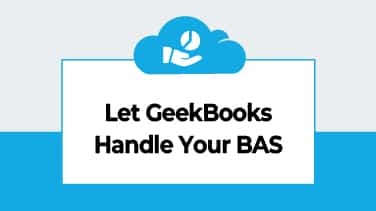
Let GeekBooks Handle Your BAS
Dealing with BAS doesn’t have to be a headache!
Here at GeekBooks, our experienced bookkeepers and accountants offer comprehensive BAS preparation services to help your business stay on top of its taxation obligations with minimal fuss.
Our accurate and timely BAS submissions will free you up to focus on what you do best- running your business.
Get in touch with our team today by completing this online booking form or calling 02 9158 3591.


